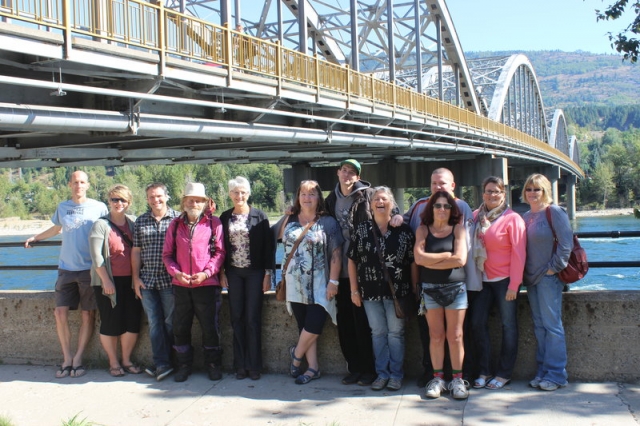Sleeping rough ... for the Getting to Home Program
On September 12, a group of forty people from Greater Trail, including Rossland’s Andrea Winckers, Mike Kent, Aaron Cosbey and Gareth Cryer will be sleeping under Trail’s Victoria Street Bridge to raise money and bring awareness to the issue of homelessness in the Greater Trail Area. Funds raised will go to support the Getting to Home: Addressing Homelessness in Greater Trail Program.
Getting to Home has operated through the collaborative efforts of Trail’s Career Development Services and Skills Centre for the past two years. Since March 2012, they have helped 163 people in the Greater Trail Area with housing and other supports. The program was developed based on a one-time grant from the federal government and has continued on in a more limited fashion though the generous funding of a variety of local donors including:
- City of Trail
- Village of Fruitvale
- Teck Metals Ltd.
- Agg Family Foundation
- LeRoi Foundation
- 1973 JL Crowe Grad Class Reunion
- Kootenay Savings Credit Union (Trail Branch Care Wear Fund)
Sheila Adcock, Program Coordinator for Career Development Services, reviewed some of the reasons Getting to Home has been so successful in helping people. The program is based on principle of not just housing people in need, but helping them to address other issues and maintain housing stability.
Adcock noted that, “Sometimes people who are homeless are just one barrier away from finding a place to live.” The trouble is, that barrier is sometimes a large one, such as a large unpaid utility bill, no address at which to receive pension cheques or inability to pay the first month’s rent. The program tries to identify these barriers and address them. “Sometimes people have a family support system and people who are willing to help them in another community. They just can’t get there. So we help them with transportation. It’s not just about getting them into a house,” Adcock observed.
Likewise, landlords are sometimes reluctant to rent to people who have had housing challenges. Adcock indicated, “We also assist landlords to deal with any tenant issues that might come up. Our focus is on providing wrap-around service, not just a Band-Aid.”
But the Getting to Home program needs more community support to maintain the level of services that it has been providing, which is part of the reason for the upcoming fundraising event on September 12. Some of the participants are collecting traditional pledge forms, but Winckers and Kent are raising money through their social fundraising platform, Yodel, which allows you meet two goals at once: pursuing a personal or group challenge while also raising money for a cause.
When asked why they it was important to them to support the program and the event, Winckers observed, “We know about the issues of homelessness in Greater Trail and wanted to be able to do something about it. People often think that homelessness is something that only affects certain kinds of people, but many of us are just a few wrong or unlucky turns away from homelessness. It doesn’t take much—an injury, job loss or stressful family event—to end up in trouble and lose your home. If something happened to you, or someone in your family, you would want to know that the support services are there, and right now, there are not enough of them.”
Gary Camozzi is one of the people who has received support from the Getting to Home program. For Camozzi, frostbitten feet forced him to seek help. “I snowshoed to town and got myself to the hospital. I didn’t want to, but I knew I had to. These people showed up. I didn’t realize they existed. They came in and said you should have a place where you can be looked after.”
Kent commented, “We’re not looking forward to sleeping under the bridge. But we’re willing to do it because it will raise awareness. And it may be uncomfortable, but it will be nowhere near what homeless people actually experience. We will be safe, as the RCMP will be there. We’ll have sleeping bags and it will only be for one night.”
Kathy Moore is an honourary member of the Yodel team, and although she is out of town and cannot participate, is very supportive of the event and the program. Moore observed, “This Fundraiser is an excellent way to raise awareness of an issue that to many people is invisible. We don’t see a lot of homelessness or poverty but it’s all around us in the Lower Columbia communities. People in need from Rossland head down the hill to Trail because that is where the support services are located. The other local governments in the area recognize that this is a regional issue and have voted to fund the program for several years. It’s disappointing that Rossland council did not contribute.”
Kent seconded this, “Just because the services are not in Rossland doesn’t mean we don’t have to be aware of them and support them.”
You can donate to the program and pledge the Rossland group sleeping under the bridge by going to Yodel. Proceeds raised through Yodel will be contributed to the Getting to Home program.






















